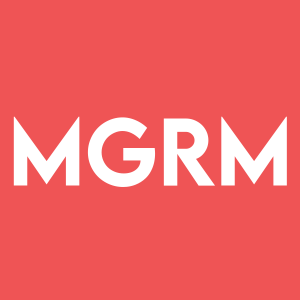Monogram Provides Regulatory Update Following Meeting with FDA
Rhea-AI Summary
Monogram Orthopaedics Inc. provided an update regarding its mBôs surgical system regulatory path after a meeting with the FDA, revealing accelerated 510(k) submission plans for early second half of 2024. The FDA feedback on the Q1 2023 submission was positive, supporting a least burdensome approach to clinical data acquisition. Management aims to conduct an OUS clinical trial, estimating costs at $1.5M, to support post-launch marketing. Monogram anticipates leveraging OUS clinical data and an accommodating FDA stance towards it to expedite technology pipeline development, including mVision tracking solution. Verification and Validation testing nearing completion in Q2 2024, with a 510(k) submission expected in late 2024. The company's modified mBôs system design aims to minimize the risk of FDA clinical data requests. Various tests and validations are progressing well, with strategic engagements with external partners, including MCRA, aiding in regulatory strategy execution.
Positive
Positive feedback from the FDA on the Q1 2023 submission, endorsing a least burdensome approach to acquiring clinical data.
Anticipated cost savings and time benefits with an OUS clinical trial, estimated at $1.5M.
Expeditious development and commercialization prospects with an OUS clinical strategy and favorable FDA stance towards OUS data.
Verification and Validation testing progress on track, nearing completion in Q2 2024.
Strategic engagement with MCRA to support regulatory strategy for submission.
Negative
Although the FDA feedback was positive, there is always a risk of additional requests or changes during the submission process.
The estimated cost of running an OUS clinical trial at $1.5M could impact the company's financials if unexpected expenses arise.
News Market Reaction – MGRM
On the day this news was published, MGRM declined 5.57%, reflecting a notable negative market reaction.
Data tracked by StockTitan Argus on the day of publication.
510(k) Submission with FDA Accelerated for Early Second Half of 2024
AUSTIN, TX / ACCESSWIRE / May 1, 2024 / Monogram Orthopaedics Inc. (NASDAQ:MGRM) ("Monogram" or the "Company"), an AI-driven robotics company focused on improving human health with an initial focus on orthopedic surgery, today provided an update related to the regulatory and commercialization path for its mBôs surgical system following its meeting with the U.S. Food and Drug Administration (the "FDA").
On April 19, 2024, Monogram received written feedback from the FDA regarding the Company's Q1 2023 pre-submission request. Subsequently, Monogram conducted a teleconference meeting with the FDA on April 24, 2024, to discuss the written feedback further and obtain feedback on the Monogram mBôs™ TKA System verification test plan, including a proposed clinical trial protocol on an outside the U.S. (OUS) target population. Management believes the feedback was comprehensive and will be advantageous for preparing a successful 510(k) submission to obtain clearance.
The Company shared with the FDA various test protocols essential for establishing the safety and effectiveness of the Monogram mBôs™ TKA System and a synopsis of its proposed OUS clinical investigation plan.
Based on the feedback, management assesses that: 1) the proposed testing plan generally appears acceptable to address the technical differences identified with the proposed predicate device, and 2) for the active (also autonomous) embodiment of its product, a clinical testing plan that includes approximately 100 knee surgeries conducted on an OUS population at three sites with three months of follow-up should generally be sufficient for evaluating the safety and effectiveness of the Monogram mBôs™ TKA System. Notably, on March 21st, the Company announced that it had modified the Monogram mBôs™ TKA System to reduce the likelihood of an FDA clinical data request with its submission.
In their written response the FDA indicated they support a least burdensome approach to acquiring clinical data. Management anticipates running an OUS clinical trial could save the Company significant cost and time. Currently, management estimates the cost to run an OUS clinical trial as proposed to be approximately
Updated Key Objectives
- Given the favorable FDA feedback for using OUS clinical data, Monogram management anticipates establishing an ongoing OUS clinical strategy to support its innovation strategy. Access to an extensive OUS surgeon and hospital network and an accommodative FDA posture towards OUS data could accelerate the development and commercialization of its technology pipeline, including mVision, its novel tracking solution that aims to eliminate point based registration and tracking with large fiducial based arrays.
- The Company recently announced that the Verification and Validation testing will be largely complete in Q2 of 2024 and anticipates a 510(k) submission to follow in the second half of 2024.
The Company's plan to aggressively accelerate 510(k) submission for its mBôs surgical system with design modifications that management believes reduce the risk of a clinical trial request is on track. The Verification and Validation testing is underway, and the Company has largely completed various mandated packaging, biocompatibility, sterilization, and cleaning validations. Except for ongoing IEC testing, most tests that rely on outside vendors are on track or largely complete. For IEC testing, the Company has largely completed various mandated radiated emissions and immunity testing. The paperwork reviews are largely complete, and various electromechanical and safety tests are starting soon. The Company believes the system will perform favorably in outstanding IEC testing based on completed internal testing and various design considerations. One of the most demanding test protocols is the Human Factors Evaluation and Design Validation, which requires at least 15 surgeons to use the system in a simulated surgery. The Company is using much of the data from these labs to test other aspects of the system, such as system accuracy. The Company has completed six simulated surgeries, with a significant remaining portion planned in May 2024.
Monogram has engaged MCRA, a US-based Contract Research Organization (CRO), to support its regulatory strategy for submission.
"Our team has been actively executing extensive, highly rigorous internal and external testing while diligently incorporating feedback from the FDA," said Ben Sexson, Chief Executive Officer of Monogram. "We continue to expect verification and validation to be largely complete in H1 2024, with a planned FDA 510(k) submission in H2 2024. We believe an OUS clinical data strategy could become valuable for ongoing research, development, and commercialization efforts."
Dave McGurl, Vice President, Regulatory Affairs at MCRA, commented: "Monogram's engagements with the FDA have been highly constructive, with the Company having incorporated the FDA's feedback into the mBôs™ TKA System design. After numerous communications with the FDA and extensive clarity provided by the Monogram team, the Company should be set up for success with the 510(k) submission to the FDA for clearance. The Company has taken patient safety extremely seriously, which is apparent in numerous aspects of the design. The Company's verification and validation plan appears to satisfy all the FDA's stated concerns, and the FDA has been supportive of Monogram following a least burdensome approach to clinical data procurement. We look forward to continuing to support Monogram through its submission and clearance."
Upcoming 2024 Milestones
- Largely complete mBôs system verification and validation - H1 2024
- Submit 510(k) application to FDA - H2 2024
- Commence OUS live-patient surgery trials - H2 2024
- Expanded international relationships
About Monogram Orthopaedics
Monogram Orthopaedics (NASDAQ:MGRM) is working to develop a product solution architecture with the long-term goal of enabling patient-optimized orthopedic implants at scale by linking 3D printing and robotics with advanced pre-operative imaging. The Company has a robotic system that can autonomously execute optimized paths for high-precision insertion of implants in synthetic bone specimens. Monogram intends to produce and market robotic surgical equipment and related software, orthopedic implants, tissue ablation tools, navigation consumables, and other miscellaneous instrumentation necessary for reconstructive joint replacement procedures. The Company has not yet made 510(k) premarket notification submissions or obtained 510(k) clearances for its robotic products. FDA approval is required to market these products, and the Company has not obtained FDA approval for any of its robotic products, and it cannot estimate the timing or assure the ability, to obtain such clearances.
Monogram Orthopaedics is working to advance the way orthopedic surgery is done. Our system is being developed to combine personalized knee implants with precision robotic surgical assistants to hopefully give patients a better-fitting knee replacement with minimally invasive surgery. One hundred thousand knee replacements failing each year in a
To learn more, visit www.monogramorthopedics.com.
Forward-Looking Statements
This press release may include "forward-looking statements.'' To the extent that the information presented in this presentation discusses financial projections, information, or expectations about Monogram Orthopaedics Inc.'s business plans, results of operations, products or markets, or otherwise makes statements about future events, such statements are forward-looking. Such forward-looking statements can be identified by the use of words such as "should," "may," "intends," "anticipates," "believes," "estimates," "projects," "forecasts," "expects," "plans," and "proposes."
Although Monogram Orthopaedics Inc. believes that the expectations reflected in these forward-looking statements are based on reasonable assumptions, there are a number of risks and uncertainties that could cause actual results to differ materially from such forward-looking statements. You are urged to carefully review and consider any cautionary statements and other disclosures, including the statements made under the heading "Risk Factors" and elsewhere in the offering statement filed with the SEC. Forward-looking statements speak only as of the date of the document in which they are contained, and Monogram Orthopaedics Inc. does not undertake any duty to update any forward-looking statements except as may be required by law.
Investor Relations
Chris Tyson
Executive Vice President
MZ North America
Direct: 949-491-8235
MGRM@mzgroup.us
SOURCE: MONOGRAM ORTHOPAEDICS INC
View the original press release on accesswire.com







